Tech Advantage
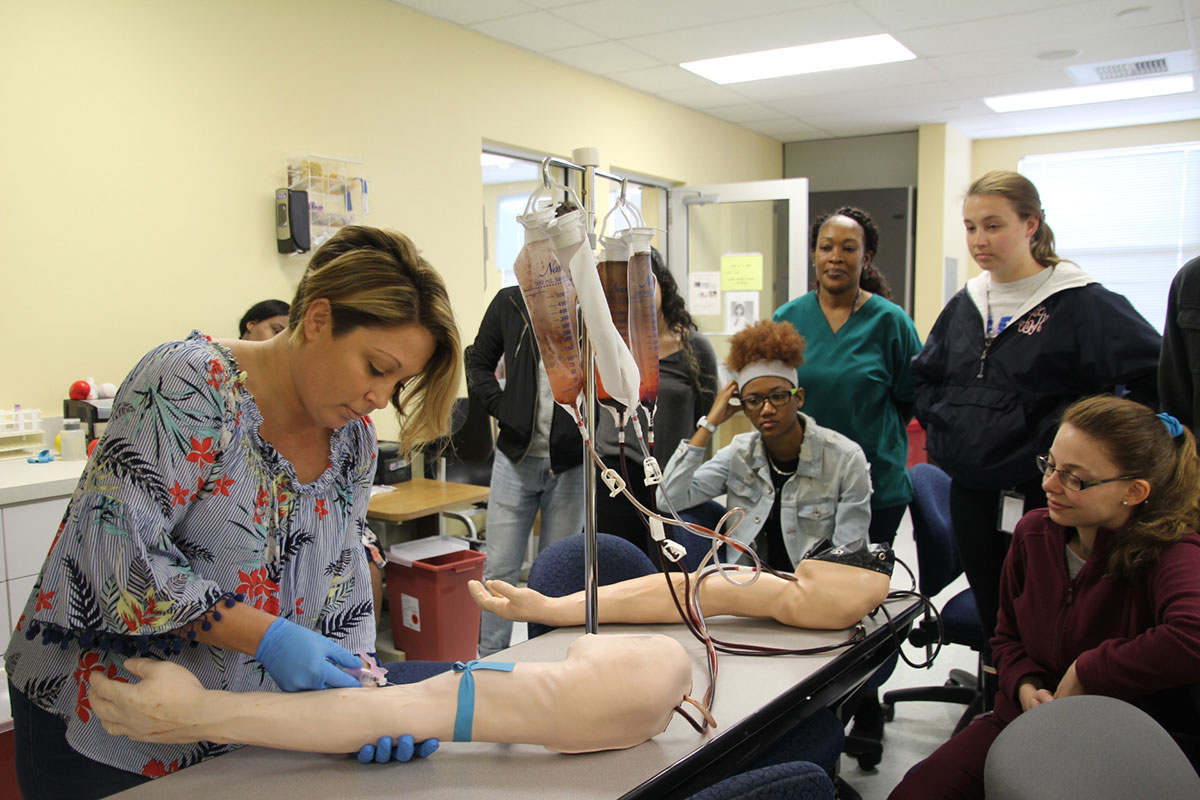
Students in the medical assisting program at Treasure Coast Technical College use lifelike, high-tech models to practice but must also be “stuck” themselves, drawing and having blood drawn from each other in the class. CHRISTINA TASCON PHOTOS
Programs at technical college will make the difference for students in Indian River and surrounding counties
BY CHRISTINA TASCON
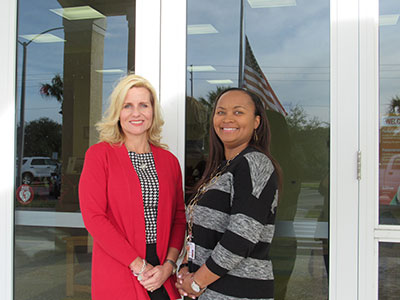
Just one tiny pebble will cause a wave along the shore. The hope for the new Treasure Coast Technical College, located in the heart of Gifford, is that those who take advantage of its programs will be on that wave to their future.
Hundreds of students have gone through its doors since it opened in 2018. Although the effect on the local economy is yet to be seen, the expectation is that it will have a noticeable impact.
TCTC is an immaculate facility which not only has all the bells and whistles but the backing of state education officials and the School District of Indian River County as an educational beacon.
“We currently have 41,000-square feet with 20 classrooms which include designated lab areas,” says Christi Shields, principal at the college. “We have a student lounge with plans of turning it into a full-service cafeteria next year with the addition of a culinary arts and hospitality program.”
Career programs currently offered are in practical nursing, medical assisting, nursing assistant, phlebotomy, pharmacy tech, welding technology, building trades and construction design. They also offer GED classes, adult education and commercial driving licensing.
“I’m in awe,” says the Rev. Ronald T. Young after visiting the new TCTC campus with the Pastor’s Association of Indian River County. “That school has so much to offer. After hearing about the programs they have, my cousin, who’s an educator in another part of the state, said, ‘It is what many school districts in Florida wish they had!’”
This is just one such accolade by those who have either visited the college, attended classes or been a part of its development.
NAME CHANGES
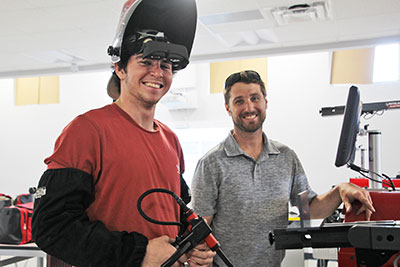
TCTC’s roots began in 1970 as Adult and Community Education; it then changed to the Technical Center for Career and Adult Education in 2014.
“The name was changed again in 2018 to incorporate the word ‘college’ as 46 out of the 49 technical centers in Florida now use college in their name,” says Shields, who was the initiator of the new branding.
The name upgrade coincided with a move from a location behind the Freshmen Learning Center by Vero Beach High School to its present location at 4680 20th Court, just steps from Gifford Middle School.
Addressing the school as a college reflects the vision of bringing vocational schools, job training or adult education to a legitimate educational value. There is a call to have students look for alternative ways in thinking about education to find employment that no longer uses four-year degrees as the standard path.
“Most jobs require some training beyond high school,” says Shields. “This is where technical colleges provide a vital role in developing and training the local workforce and doing it in a relatively short amount of time.”
Laura Zorc, chair of the Indian River County School Board, is a huge supporter of the high tech, modern facility.
“It will promote economic diversity by serving students of any age, race, or economic class,” she says. “It’s a great opportunity for both kids and adults. This community is blessed, I hope everyone takes advantage of it.”

ALTERNATE ROUTE
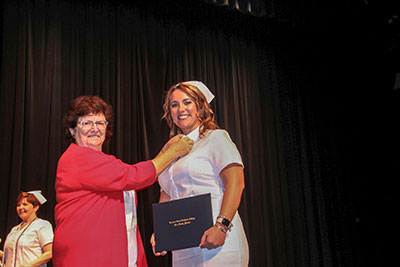
Not every person is able to afford the luxury of spending four to eight years attending classes. A degree also no longer guarantees a secure future in the world. Many graduates are having to continue living at home or take positions outside of their field of study to support themselves.
The reality is that schools like Treasure Coast Technical College offer a lifetime career in a much more timely, affordable and practical manner.
Benjamin Camp is a student in the welding technology program. He is in his fifth month of a nine-month course and is already using his knowledge helping a friend mend metal-chain link fencing. His goal is to eventually own a company that fabricates and manufactures Porsches. Camp knows of a place that works on Porsches in Stuart where he wants to work when he graduates to get some practical experience.
“In less than a year of training, I could make upwards of $60,000 to $100,000 a year,” says Camp. “I was thinking about going to a college and getting a four-year degree, but so many friends and family have actually gotten degrees and really don’t do anything with them. I am going to finish with a trade under my belt and be able to work for myself one day and do things on my own.”
Camp says that once he has his own business, he can then hire other employees to do the physical labor.
“That’s the plan, that’s the dream,” Camp says, smiling.
Perhaps Camp can even cull his employees from another graduating class of TCTC’s welding program to begin that ripple effect by elevating another student.

PRACTICAL SOLUTION
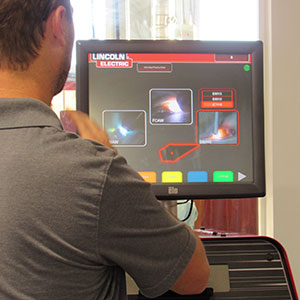
Many students who live in low- to middle-income families need to find employment immediately after high school. TCTC can speed up the possibility that they can make a livable salary soon after graduating, especially in courses that offer dual enrollment.
All of TCTC’s programs can be completed in a year or less and lead to an industry certification at an affordable cost. What can cost in the tens of thousands of dollars in tuition, housing, food costs, books and course materials at a university are available for under a third of that at TCTC.
“What would have cost me $22,000 at Florida universities cost just a little over $7,000,” says Taylor Davis, a practical nursing graduate. “Almost everyone in my class also had some kind of funding which helped, such as Pell grants, scholarships, or money from the workforce agency, CareerSource Research Coast.”
Davis is the daughter of Indian River County Property Appraiser Wesley Davis. She and 47 other students from the medical program graduated Dec. 14, 2018, at a formal ceremony held at the Vero Beach High School.
“It was a yearlong project and I am really proud of her,” says her father. “I am also proud that we have this kind of program right here in our backyard. What I hope happens is that they continue to grow the program, because the number of people that applied this time and didn’t make it could have a graduation class three times this size. This is something that the school board of Indian River County should be so proud of for their forward thinking.”
Also included in that group was the daughter of Vero Beach Police Chief David Currey. Kennedy Currey was the valedictorian for the medical assisting program. She is the chief’s oldest daughter and, at 24, is beginning a promising phase in her life.
With their certifications, both Davis and Currey have a hard-to-get admission advantage over other applicants at Indian River State College to continue their education for additional medical training.
SCHOOL BOARD SUPPORT
Zorc was involved in the initial millage discussions with the school board on whether to go forward with the technical college.
“The TCTC was a vision put into action three years ago by Principal Christi Shields,” says Zorc. “In three short years, the vision has become reality with the robust support of the school board, county taxpayers, and district leadership.”
Zorc relayed these statistics:
“Parts of our county have high levels of poverty, which have been present for generations. More than half of our student population qualify for free and reduced lunch (62 percent). In the latest census, one in four of our children live in poverty (25 percent). This is an opportunity to break the cycles of generational poverty in Indian River County and remove the barriers of transportation and accessibility to career certifications.
“I believe that the school district’s expansion of its technical college will promote economic diversity by serving students of any age, race, or economic class. It will provide a pathway out of poverty for residents who have heretofore been unable to financially access workforce training programs. Job training will lead to employment in a job market searching for a skilled workforce and growth for local businesses with the added benefit of financial stability for families.”
TOURING THE CAMPUS

Many youths from student organizations have toured the TCTC campus since it opened. The hope is that one of the courses will connect with a few students who will choose a path to their future.
“When I decided to take the students from the Gifford Youth Achievement Center to TCTC it was because I wanted to provide them with an opportunity to explore other career and technical programs,” says GYAC guidance counselor Carrie Williams. “TCTC provided a behind-the-scenes view of what each career offered, to give them the opportunity to decide if this was a field in which they could see themselves taking on as a career.”
On the tour, many of the students were surprised by the sight of a very realistically staged hospital ward, which included many human-looking patient mannequins.
Others were fascinated by the virtual reality welding program in the construction and trade building, vying for a try at writing their name in metal. What they thought would be another boring school tour turned into a fun, eye-opening experience to some achievable dreams.
All the training is very realistic, using top-of-the-line mannequins and trade machinery used in real jobs, but none was more real than in the phlebotomy classes where students must learn to draw blood by using each other as patients.
Students first practice on a very realistic disembodied arm, but after initial “sticks,” they must become used to working on real people. Students are required to complete almost double the sticks as in many other schools.
“Our courses have a higher passing rate for national certification exams than other areas of the country,” says medical assisting instructor Tracy Mitchell. “Our programs not only fulfill a need for the community, but it fulfills it to a really high level for a top-notch education.”
TCTC also works with many businesses to help its students find jobs right after graduation, and that translates into higher levels of employment, lower poverty levels and brighter futures for the people in the area.
MAIN CAMPUS
Treasure Coast Technical College
4680 28th Court
Vero Beach, FL 32967
Phone: 772.564.4970
https://tctc.indianriverschools.org
UPCOMING SEMESTER BEGINS MARCH 1, 2019
CAREER PROGRAMS
(All costs are approximate and must be confirmed before admission. Additional costs include various fees such as uniforms, background check, state testing and all books.)
• Nursing Assistant (Dual Enrollment) - $666.80
• Medical Assisting; Medical Coder/Biller - $1,894.80
• Pharmacy Technician - $3,391
• Phlebotomy (Dual Enrollment) - $581.80
• Practical Nursing - $5,059
• Building Trades & Construction Design Technology (Dual Enrollment) - $3,258
• Welding Technology (Dual Enrollment) - $4,182
Adult Basic Education (ABE), General Educational Development (GED), English Language Learners (ELL)
Tuition is $30 per term & $10 TABE
Personal enrichment courses, ranging from computer skills to foreign language, are also available.
Admission is available to anyone, but non-Florida residents do have a higher payment scale. A non-resident is defined as someone who has no documentation to prove they have lived in Florida for at least 12 months.
Financial Assistance is available for career programs. Students must meet qualifications guidelines and funds are limited, offered on a first come-first serve basis. For more information about financial aid, please contact us at 772.564.4972.
FINANCIAL ASSISTANCE REFERRAL AGENCIES
CareerSource Research Coast: Indian River County – 772.494.2100
Indian River County Youth Connections (ages 16-24) – 772.342.6150 St. Lucie County – 772.461.6293
AARP Foundation Senior Community Service Employment Program Indian River County – 321.956.1444
Vocational Rehabilitation Indian River County – 772.778.6348
EOC Reach Program Indian River County – 772.569.1030
Farmworkers Jobs & Educational Programs (IRSC)
Indian River County – 772.462.7916
